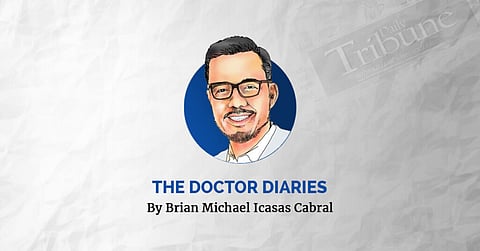
- NEWS
- the EDIT
- COMMENTARY
- BUSINESS
- LIFE
- SHOW
- ACTION
- GLOBAL GOALS
- SNAPS
- DYARYO TIRADA
- MORE

Late one evening, as I reminded my child to set away her tablet and finish her homework, my phone vibrated insistently. “Doc, sorry, urgent lang talaga…” A blurry photo of an elderly patient’s swollen foot appeared on screen. I replied instantly -- not because of obligation, but because worry doesn’t wait for morning. Years ago, I made a promise, hand on a Bible and a patient’s chest, never to withhold help when it was mine to give.
This promise remains unchanged, yet practicing medicine in the Philippines today is becoming increasingly difficult. A new medical resident in Metro Manila earns roughly ₱38,000 monthly, comparable to entry-level call-center salaries, but endures exhausting shifts exceeding 30 hours. Even experienced specialists find themselves waiting months for delayed PhilHealth reimbursements and bargaining endlessly with HMOs for fees frozen in time.
Meanwhile, overhead expenses continue their relentless climb. A modest clinic in Quezon City easily costs P40,000 per month. Add in staff salaries, license renewals, mandatory continuing education, malpractice insurance and essential equipment -- none subsidized. Doctors quietly absorb these escalating costs, responding nightly to patient concerns that won’t generate professional fees.
This isn’t about greed. Most of us accepted early on that medicine wouldn’t make us wealthy. If financial comfort had been our goal, we’d have chosen other paths. What truly weighs on us is the widening gap between public perception -- doctors portrayed as comfortable -- and our daily reality of quietly balancing multiple roles simply to meet basic needs.
This disconnect is exhausting, rarely voiced openly, but deeply felt. Burnout among Filipino doctors is alarmingly common. A 2024 Philippine Medical Association survey showed over 60 percent of physicians considered leaving clinical practice. Many have already left for overseas opportunities, driven by financial strain and frustration over delayed payments and overwhelming workloads. Each departure creates gaps, stretching an already fragile healthcare system even thinner.
Recent policy decisions involving PhilHealth have intensified these pressures. The Universal Health Care (UHC) law, enacted in 2019, promised comprehensive health protection for all Filipinos. Yet, recent government choices have dangerously undermined PhilHealth’s financial stability. Scheduled premium increases were deferred, and the 74 billion government subsidy allocated for 2024 was entirely removed for 2025, risking severe repercussions for universal healthcare. PhilHealth’s widely cited P488 billion reserves aren’t surplus funds waiting to be used elsewhere —- they’re necessary buffers against future healthcare obligations, barely meeting actuarial requirements. In 2023 alone, PhilHealth collected approximately P195 billion in premiums, but surging payouts and delayed reimbursements to hospitals have already placed immense strain on the system. Smaller hospitals, especially in provincial areas heavily dependent on timely PhilHealth payments, now face real threats of scaling back or even closing entirely.
Patients carry the heaviest burden. Despite promises of universal coverage, Filipinos still pay nearly half their healthcare expenses out-of-pocket — among Asia’s highest rates. Every day, families face impossible decisions, choosing between essential medical care and financial survival — choices no one should be forced to make. Successful universal healthcare models abroad, like those in Thailand and Japan, show what’s achievable through stable, predictable funding. Thailand’s tax-funded approach ensures even its poorest citizens receive necessary care without financial ruin. Japan maintains a balanced model, combining member contributions and government subsidies, resulting in a reliable healthcare system resilient to political whims. Both countries view healthcare as a critical long-term investment rather than a short-term political bargaining chip.
Healthcare experts, including those at the World Health Organization, continually stress the importance of stable funding for universal healthcare success. Recently, Senator Risa Hontiveros voiced concerns that eliminating PhilHealth’s subsidy risks abandoning vulnerable citizens, while advocacy groups warn these policy shifts significantly erode public trust. Indeed, PhilHealth urgently requires reform — greater transparency, efficient claims processing, and robust anti-fraud measures. Yet, reforms alone aren’t sufficient; stable, predictable funding must accompany these changes. Short-term financial convenience shouldn’t jeopardize healthcare’s long-term stability.
Policymakers must urgently reconsider recent funding decisions, including gradually reinstating premium increases, restoring adequate government subsidies, exploring diversified funding sources like targeted sin taxes, and investing proactively in preventive healthcare. These actions can help stabilize and strengthen our healthcare system sustainably. Healthcare funding transcends mere numbers — it’s fundamentally about lives, dignity, and national well-being. As doctors, we witness firsthand the profound impact of policy decisions. Patients, too, play a crucial role by actively advocating for reliable healthcare support. Ultimately, policymakers have the profound responsibility to ensure healthcare remains accessible, stable and sustainable.
Just recently, fresh concerns emerged about further possible delays in PhilHealth reimbursements, adding urgency to our plea. Healthcare should never become a victim of political convenience. As medical professionals, patients, and citizens, we must advocate collectively to secure and strengthen our healthcare system. Trust is the bedrock of healthcare — once compromised, it is incredibly challenging to restore. Let’s act decisively now, because in healthcare, every decision we delay today risks becoming tomorrow’s crisis.
